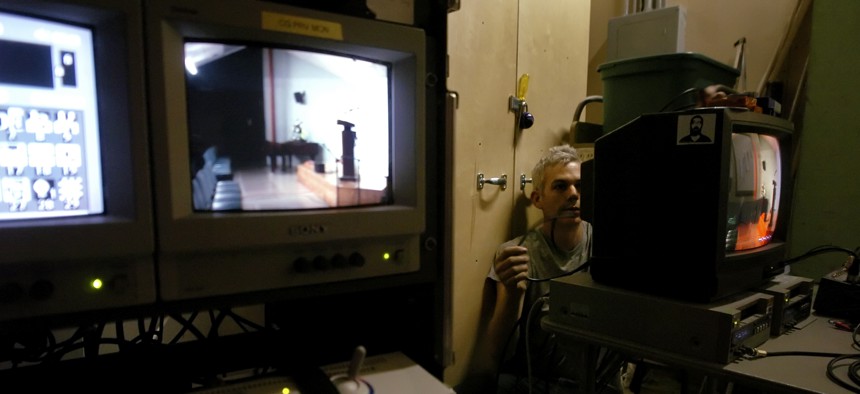Public Access Channels Threatened Under FCC Proposal, Advocates Say

Jeremy Taylor, a volunteer with The People's Channel sets up the video feed for a location production at the 3rd Annual Burke Awards in Chapel Hill, N.C. on April 21, 2006. AP Photo
Proponents, however, argue changes are needed because localities charge licensing fees at the expense of cable companies’ efforts to expand broadband access.
Watching broadcasts of city council or school board meetings on the public access cable channel could become a thing of the past under a new proposal being considered by the Federal Communications Commission, local government officials say.
The big cable providers like Verizon and Comcast are often obligated to set aside channels for this kind of programming, as well as contributing to operation of the stations.
Cable companies also pay franchise fees to local governments to access the public rights-of-way. The proposed FCC rule would make changes to the franchise fee arrangement, making clear that local governments in these agreements are limited to regulating cable services and can’t expand their authority into broadband internet access.
In letters to the FCC, local government leaders and people running access channels say the proposal could result in less money for them to run their stations and develop programming. In part, this would come because cable companies under the new rule could count “in-kind” resources like the value of the public access channel against their capped fee obligations, they say.
U.S. Sen. Ed Markey, a Massachusetts Democrat, and 10 Senate Commerce Committee colleagues also objected to the proposal in a letter to Republican FCC Chairman Ajit Pai, noting that their constituents rely on the public, educational and governmental (PEG) channels, which carry broadcasts of meetings, offer local programs and alert residents in the case of emergency.
“Your proposal may jeopardize these important functions,” the senators wrote. “If this order is eventually adopted in its current form, cities and towns across the country may soon have to decide between supporting local PEG channels and supporting other critical institutions serving the public good.”
There are more than 1,500 PEG studios and 3,000 channels across the U.S.—religious programming making up about 30 percent of their content, according to Markey’s office.
Gaithersburg, Maryland strongly opposes the FCC rulemaking, noting that the city’s PEG channel offers live, repeat broadcasts of city council and other meetings
“These broadcasts allow the City to conduct its business in the open and they offer an opportunity for our residents to observe government in action for those who may be unable to attend meetings in person or have access to watch the proceedings on the internet,” said Mayor Jud Ashman in a letter.
Ascertaining the “fair-market value” of local cable production resources is difficult and would likely lead to Gaithersburg being shortchanged, Ashman said.
Jeff Hansell, executive director of the Belmont Media Center in Massachusetts, raised similar concerns. BMC runs three public access channels.
In a post on BMC’s website, Hansell warned that the proposed rule would mean that the organization wouldn’t be able to allow members of the public and schools access to the center to create programming and stream it on cable or the web. “One of our most powerful, most democratic local resources could be lost,” he wrote.
Not everyone is opposed to the new rule.
Citizens Against Government Waste said local governments use licensing fees on cable rights-of-way to increase their revenues and, sometimes, divert the money to pay off things like public pension debt.
“These additional fees and taxes are not just borne by companies striving to deploy new networks across the country, they are also passed along to consumers to offset the increased cost to deploy new services,” said Thomas Schatz, president of CAGW, in a letter. “By increasing the cost to use rights-of-way, these municipalities are creating a barrier to entry for new broadband deployment in their communities.”
The FCC could consider the rule as soon as December, and the deadline for public comments on the amendment is Nov. 14.
Dave Nyczepir is a News Editor at Government Executive’s Route Fifty and is based in Washington, D.C.

NEXT STORY: Every City Should Have a Toy Library






